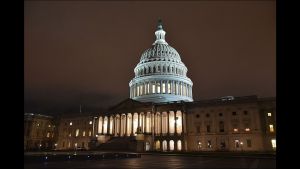Younger Americans' Views on Taiwan Still Taking Shape

Council surveys find that younger Americans are still forming their views on Taiwan and US-Taiwan relations.
Past Council research into generational differences has shown that older and younger generations in the United States hold distinct views on a number of foreign policy issues. But as I noted in my last piece on generational attitudes and US-China relations, younger Americans are also notably more likely to say they don’t know enough to categorize US relations with China, a response that increases in proportion with each younger generation. As the Council’s 2021 survey work shows, this tendency is even more pronounced when it comes to US-Taiwan relations.
Once again, we are using Pew’s definitions of the generational cohorts. Our current surveys include members of the Silent generation (born 1928-1945), the Baby Boomers (1946-1964), Gen X (1965-1980), Millennials (1981-1996), and Gen Z (1997-2012).
When presented with a series of potential policies the United States could take regarding Taiwan, few younger Americans outright oppose any of the proposed policies. But they are more likely than older generations to respond that they don’t know enough to say. Even so, majorities of even Millennials support a variety of US policies toward Taiwan, including recognizing it as an independent country (64%), supporting its inclusion in international organizations (56%), and signing a US-Taiwan free trade agreement (50%).
Americans across generational lines are more hesitant to commit to the military defense of Taiwan. Only a narrow majority of Silents (53%) support such a commitment, though more Americans are willing to sign on to an alliance with Taiwan (including majorities of Silents, Boomers, and Gen Xers).
The generational gap when it comes to an American defense of Taiwan has grown in recent years. In 2018, Americans of all ages were uninterested in sending US troops to defend Taiwan from an invasion by the PRC. Though all generations have become more likely to support a US defense of Taiwan, support for US involvement has risen at different rates across generational cohorts. Today, a majority of Silents (62%) and Boomers (56%) support sending US troops to defend Taiwan, while Gen X is split (50% favor, 49% oppose) and a majority of Millennials oppose doing so (54% oppose, 44% favor).
One potential reason for the lower level of support among younger Americans: an unfamiliarity with Taiwan. When asked to characterize the US-Taiwan relationship, a plurality of Millennials say they “don’t know” (43%), more than who say Taiwan is an ally (26%) or a necessary partner for the United States (24%). And while we have relatively few Gen Z respondents in this item (n=73), they are even more likely to give a “don’t know” response to the US-Taiwan relationship. By comparison, older Americans—those from the Silent or Baby Boom generations—are more likely to categorize Taiwan as a US ally or partner.
What does this high proportion of “don’t know” responses mean for those active in the debate over America’s Taiwan policy? Simply put, public attitudes towards these critical issues, particularly the attitudes of younger Americans, is very much yet to be determined. Unlike older Americans who may have more set views of Taiwan—and who have lived through previous major episodes in US-Taiwan (and US-China; China-Taiwan) relations—younger Americans’ views are still being set by the events of the day and how they are covered.
Moreover, younger Americans get their news from different sources. One notable difference: nonengagement with TV news, still a staple for older generations of Americans. In fact, when asked what television news source they trust the most to provide accurate information about politics and current events, a third of Millennials (36%) and a majority of Gen Z (54%) say they do not watch any television news.
Instead, younger Americans are far more engaged with the world online. And that online engagement is also resulting in online organizing for political ends. In 2016, K-pop fans (stans, in contemporary parlance) in the United States and abroad engaged in various forms of anti-Trump and pro-Black Lives Matter activism. Internationally, the Milk Tea Alliance has brought together young people in Thailand, Taiwan, and Hong Kong with a shared love of democracy (and, of course, milk tea). One group both have run into online: China’s wolf warriors.
And it’s not just activist groups taking advantage of this resource. Beijing hasn’t let a ban on Western social media networks inside the country stop it from using them to promote its messages abroad. Using a mix of bots, paid workers (“wumao”), and hacked accounts, the PRC has broadly sought to shape the online narrative in its favor, both among ethnic Chinese groups living abroad and the wider global audience. And with Millennials and Gen Z still to form their opinions, these online fights could have far-reaching real-world consequences.


Related Content
 Public Opinion
Public Opinion
Younger Americans are more confident in US power vis-a-vis China and are more likely to oppose restrictions on scientific and educational exchanges between the two.
 Public Opinion
Public Opinion
2019 Chicago Council Survey data provide insight into how Millennials view key foreign policy issues compared with previous generations.
 Public Opinion
Public Opinion
2021 Chicago Council Survey data show a majority of Americans support a range of US policies towards Taiwan: recognition as an independent country, inclusion in international organizations, and a US-Taiwan free trade agreement.
 Public Opinion
Public Opinion
While the Biden administration seems to understand where Americans stand on China and domestic renewal to support global competitiveness, the data disproves their assumptions that Americans are skeptical about trade and weary of US global engagement and leadership.